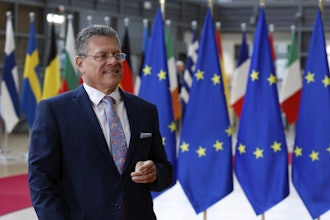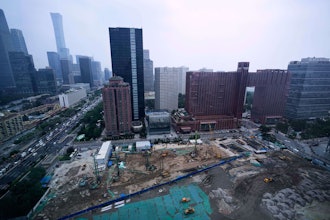
With coronavirus still spreading globally, Pfizer, Inc. and the other makers of COVID-19 vaccines are under pressure to rapidly make more. Mike McDermott heads that effort at Pfizer, where he's been president of global supply since 2019. He previously served in other operations management positions in his 30-year career at Pfizer.
The COVID-19 vaccine from Pfizer and its German partner BioNTech was the first to get the green light, from Britain in early December, followed by the United States, Europe and other countries. Pfizer makes the vaccine's main component, a piece of genetic code called messenger RNA or mRNA for short. It uses other companies called contract manufacturers to make the vaccine's protective shell and to fill, inspect and package vials.
The Associated Press spoke with McDermott recently about addressing this production challenge. The conversation has been edited for clarity and brevity.
Q: After developing your vaccine so quickly, how is Pfizer approaching the need to make billions of doses in record time?
A: There is a dire need to vaccinate more people quickly. We are expanding our capacity to make more vaccine as quickly as possible. We are making process improvements, adding more manufacturing lines within the Pfizer and BioNTech facilities, expanding use of contract manufacturers and adding more suppliers.
Q: What are those process improvements?
A: These involve getting more productivity from our existing lines. We look at reducing wait times when changing over between batches, doubling of our batch size, increasing yields per batch. We're reducing cycle times, from the start of manufacturing to shipping.
Q: What else are you doing inside your Kalamazoo, Michigan, factory?
A: We went from one production line to four lines and from one shift to three shifts. We are expanding everywhere possible. We haven't taken a day off since October.
Q: With new variants of the virus emerging, can Pfizer quickly update its vaccine to block those versions?
A: Our mRNA platform technology is the perfect science to be able to make modifications quickly. In essence there would be no changes to the manufacturing network. That altered genetic material would come into the system – and production would begin immediately on a new vaccine version.
Q: Recently Pfizer hiked its production forecast for this year from about 1.3 billion doses to about 2 billion. Are you sure you can do that?
A: Right now, we can potentially deliver approximately 2 billion doses of the COVID-19 vaccine by the end of 2021. We are confident in this commitment, but of course are constantly looking for ways to make and distribute more doses faster.


















![7 001[1]](https://img.inddist.com/mindful/im/workspaces/default/uploads/2025/06/7-0011.S7Uqlbb3HV.jpg?auto=format%2Ccompress&crop=focalpoint&fit=crop&fp-x=0.53&fp-y=0.44&h=220&q=70&w=330)



